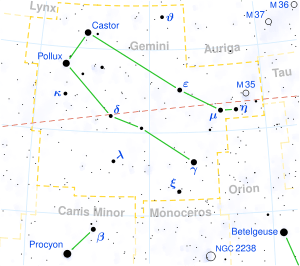Punarvasu
Punarvasu) is a Nakshatra in Hindu astrology, which refers to the two brightest stars in the constellation of Gemini: Castor and Pollux.

| Nakshatras |
|---|
|
In Malayalam, Punarvasu is called Punartham. It is also known as Punarpusam in Tamil Nadu and other parts of South India.
Legend
Punarvasu extends from 20 degrees 00 minutes of Mithun (Gemini) to 03 degrees 20 minutes of Kark (Cancer). There is also a general belief that men born under this nakshatra have only male children. There have been exceptions to this common belief.
“On completion of the ritual six seasons have passed by and then in the twelfth month, on the ninth day of Chaitra month [April–May,] when the presiding deity of ruling star of the day is Aditi, where the ruling star of day is Punarvasu (Nakshatra), the asterism is in the ascendant, and when five of the nine planets viz., Sun, Mars, Jupiter, Saturn, and Venus are at their highest position, when Jupiter with Moon is ascendant in Cancer, and when day is advancing, then Queen Kausalya gave birth to a son with all the divine attributes like lotus-red eyes, lengthy arms, roseate lips, voice like drumbeat, and who took birth to delight the Ikshwaku dynasty, who is adored by all the worlds, and who is the greatly blessed epitome of Vishnu, namely Rama.”
- Book I : Bala Kanda, Ramayana by Valmiki, Chapter (Sarga) 18, Verse 8, 9, 10 and 11 [1]
This is the birth nakshatra of Lord Rama. The word Punarvasu is derived from Puna+ Vasu, which means return, renewal, restoration or repetition. The 12 Adityas were born of Kasyapa in the womb of Aditi. The 12 Adityas are Indra, Vaga, Vayu, Twasta, Varuna, Aryama, Pusa, Mitra, Agni, Parjyanya, Vivaswan and Dinakar. The mother Aditi of whom the Gods are born is the repository of everything good-truth, generosity, magnanimity, purity, aristocracy, beauty and renown. It follows that this star is the cause for these virtues. To start afresh after having once broken off, to start a new life, to come back from a distant land-all. Punarvasu signifies these. It stands for freedom from restriction and limitation, and boundless space.
Practice
By the traditional Hindu principle of naming babies according to their Ascendant/Lagna nakshatra, the first names should start with the following Sanskrit letters for those who are born under the Nakshatra: Punarvasu or Punarpoosam
Ke (pronounced as in "Kesari")
Ko (pronounced as in "Kopperuncholan")
Ha (pronounced as in "Hara") for example Harika,Harini,Harshitha,Harish,Haritha,etc
Hi (pronounced as in "Hiranyakashipu")